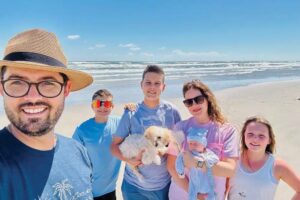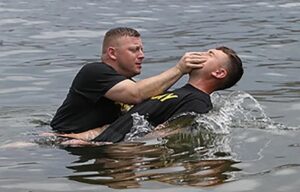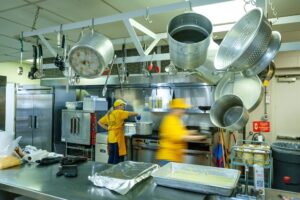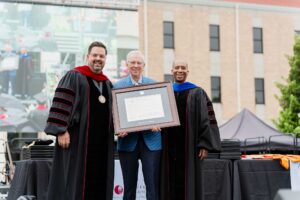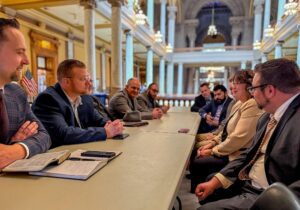Karen Pearce is an IMB worker among European peoples and contributing writer.

 Devastated families in Hungary and Serbia have been the focus of relief efforts by Southern Baptist representatives and national partners after two disasters in those countries.
Devastated families in Hungary and Serbia have been the focus of relief efforts by Southern Baptist representatives and national partners after two disasters in those countries.
In Hungary, three villages were flooded when 185 million gallons of toxic red sludge burst from the reservoir of a refinery in Ajka. In less than an hour, the hot liquid killed at least eight people, injured more than one hundred, affected the lives of seven thousand residents, and left a lasting imprint on the ecological conditions of the area for decades to come.
The worst tragedy, however, is that there is no evangelical witness in this area, Christian workers said.
Peter Marki, a national church planter in southwest Hungary, has been doing relief work in Devescer, one of three villages affected by the toxic spill. Although the disaster occurred October 4, Marki said the hopelessness lingers.
"In Hungary, we have a 'Day of the Dead' [November 1] when we go into the cemeteries and light a candle," Marki said. "Walking in Devescer and seeing candles in some of their windows made me feel as though I was walking in a graveyard. It is like they are waiting for life to start again."
Marki has organized volunteers to help rebuild homes, but the city's newly elected mayor, voted in on the eve of the disaster, has made it difficult to give real hope.
"The mayor told us not to evangelize and not to preach the Gospel," Marki said. "The town leadership doesn't want us doing any pastoral care; we only have freedom to pass out material and food."
Because of the environmental issues related to the flood, Devescer has been closed to outsiders. Only approved organizations are allowed to help in the wake of the disaster. Of the one hundred daily volunteers, Hungarian Baptist Aid is maintaining a presence, cooking for workers and inhabitants of the city, and Marki has organized a group of twenty Christian college students to deliver food and clothing and help clean.
"We are praying and helping and talking, but we work all day, the area is cold spiritually, and we can't move freely," Marki said.
This is not true in all of Hungary, however. Only eighty kilometers away, in the city of Keszthely, the assistant to the mayor has been helpful in efforts to share the Gospel, according to David and Tina Taylor, an International Mission Board church-planting couple who have begun a home group there.
The Keszthely group, with ten to fifteen people attending regularly, took up offerings and donations to send to Devescer and is praying for the possibility of future work there. A Christian publisher in Hungary has offered to publish one hundred books for distribution in the disaster area, which Marki hopes might provide an open door for witness.
The Taylors asked Christians to pray for open doors in Devescer and for the ongoing ministry opportunities there, that true life will begin to emerge in the wake of the disaster.
Serbian Earthquake
Broken glass, ceramic tiles, and rubble littered the streets of Kraljevo, Serbia, after a 5.4 magnitude earthquake shook the city November 3. More than five hundred homes have been declared unsafe and sixty buildings, including apartment buildings that house multiple families, have been condemned because they are now unstable. A total of four thousand houses were damaged.
Two people were killed and more than fifty injured. An entire wing of a hospital was damaged, forcing hospital staff to send the patients home.
Karl and Julie Bannert, International Mission Board workers partnering in Serbia with World Net, an international educational organization, have been spending their days helping with repairs and praying with frightened residents.
"We saw firsthand people sleeping in their cars and going door-to-door asking for a place to stay," Julie Bannert said. "I talked and prayed with many people, hugged the women and encouraged them that God is in control."
Karl Bannert and a local home missionary are heading up a team of national volunteers who are experts in masonry who will help rebuild chimneys and replace roof tiles. Local homes have wood stoves for cooking, necessitating the need for chimneys for ventilation and roofs made of loosely laid clay tiles. The earthquake shook the tiles loose, and many homes now have huge holes in the roof. The government made replacement tiles available to residents, but workers were needed to help with repairs.
"There is an urgency," Julie Bannert said. "And it is mostly the poor and elderly who are in desperate need."
Josh and Kristen Hepner, the World Net partners in Kraljevo, said the government has estimated it will take more than three years before many of the homes are repaired.
The majority of people in Kraljevo are Orthodox by tradition but not believers, so they have no foundation for peace in a time of crisis, the Hepners said. They have begun a home Bible study, and a few house groups are meeting, but only one evangelical church has been established in the city of seventy thousand people. The Baptist Union in northern Serbia appealed for all its churches to go to Kraljevo and help.
"They are there prepared to offer help and ready to share their faith," Julie Bannert said.
"Jovica, the church planter that has come to work with us, is using this opportunity to pull brothers and sisters together from all over Serbia to help," Kristen Hepner said. "He will use this to share the love and hope found in Jesus."
Karen Pearce is a member of Kingsville Baptist Church in Ball, Louisiana, and is an SBC representative in Europe.
To learn how to help in Hungary through volunteer work, donations, or prayer, e-mail David Taylor at davidtinataylor@yahoo.com. To stay updated about relief work and to get involved in ministry in Serbia, visit www.pray4serbs.org.
Saving Lives with Water Filters
by Mark Kelly
 Fifty families in a coastal village of Myanmar (Burma) were struggling to survive without drinking water after a ten-foot tsunami swept away their homes this fall. A Southern Baptist Disaster Relief assessment team discovered the families were not being helped by any agency, and water filters were rushed to the scene to prevent loss of life from waterborne disease.
Fifty families in a coastal village of Myanmar (Burma) were struggling to survive without drinking water after a ten-foot tsunami swept away their homes this fall. A Southern Baptist Disaster Relief assessment team discovered the families were not being helped by any agency, and water filters were rushed to the scene to prevent loss of life from waterborne disease.
The wave that swept over the village was created by a 7.7-magnitude earthquake on the same fault line that spawned the 2004 monster wave that killed 230,000 people in countries with coastlines around the Indian Ocean.
The death toll from the tsunami on October 26 of this year was estimated at four hundred in Indonesia alone.
Strong winds and rough seas made it difficult for rescue teams to get to the affected areas, which can only be reached by boat. A national partner working with Baptist Global Response, an international relief and development organization, reached a small village in Myanmar where forty-five families and a church building had once stood.
Nothing remained but families huddled under temporary shelters.
"It's a heartbreaking moment to see nothing left from this small and beautiful village," the partner reported. "A creek behind the village allowed the wave to hit them from two directions."
The director of the relief project noted that Southern Baptists' World Hunger Fund would provide clean drinking water to the victims in places like the town of Bago, Myanmar.
"There are fifty families that have become very sick in the aftermath of the floods," the project director reported. "Their homes have been in four to five feet of water. They have no source of drinking water."
The water filters, which are being distributed in partnership with local YMCA and church staff, will allow the families to live healthy lives, the project director explained.
"Instead of drinking dangerous bacteria-laden water, they will drink healthy water and not be sick on a regular basis," the project director said. "They will be able to be healthy to contribute to work and make a better life for their family. It will improve the lives of the whole community."
The water filters could be purchased immediately and rushed to the scene because of generous donations to the World Hunger Fund, said Ben Wolf, who with his wife Pam directs work in the Asia Rim for Baptist Global Response.
"If it wasn't for people who care about people in need, we wouldn't have the resources on hand to meet a crucial need like this. People would have died without the opportunity to know about and experience the love of God," Wolf said. "Please pray that the recipients of the filters will see this met need as a sign that there is a God who loves them and wants to give them a bigger and better gift."
The World Hunger Fund can be found at www.worldhungerfund.com and Baptist Global Response at www.gobgr.org.






